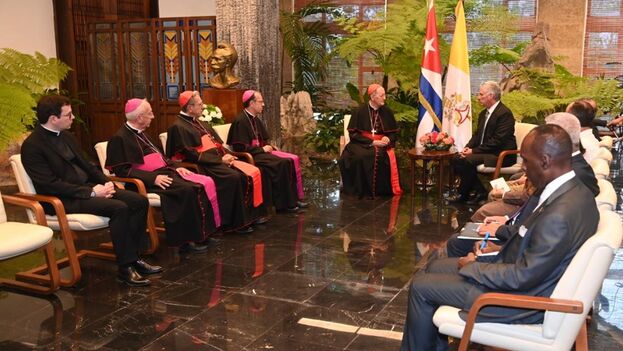
![]() 14ymedio, Havana, 4 May 2023 — “The situation is critical, a kind of perfect storm between government repression and famine.” The assertion is from the Cuban Observatory for Human Rights (OCDH), which hopes for “the intermediation of the Cuban Catholic Church” for “the release of political prisoners, the end of repression and changes that the country urgently needs.”
14ymedio, Havana, 4 May 2023 — “The situation is critical, a kind of perfect storm between government repression and famine.” The assertion is from the Cuban Observatory for Human Rights (OCDH), which hopes for “the intermediation of the Cuban Catholic Church” for “the release of political prisoners, the end of repression and changes that the country urgently needs.”
In its latest report, the organization, based in Madrid, reports at least 231 repressive actions during the month of April, of which 53 were “some type of detention.” The greatest amount of abuse was suffered by political prisoners, says the OHCHR. In addition, they point out “a high number of homes of activists raided by the political police, police subpoenas, harassment, assaults, travel impediments, fines and trials.”
For its part, the Cuban Center for Human Rights (CCDH), led by Martha Beatriz Roque, in its most recent report gives a total of 582 arrested for the massive demonstrations of July 11, 2021, who are still in prison.
Among them are 46 women and four minors: Alejandro Rosa la Fuente, 16, Rubén Alejandro Parra Ricardo, 15; Llenson Enson Rizo, 14, and Giuseppe Belaunzarán Guada, 16.
The latter is a special case, because, sentenced to 10 years in prison, he was released, details the CCDH, “for being the grandson of a lieutenant colonel” of the Ministry of the Interior, Carlos Javier Guada.
From the list, it is striking that 192 were sentenced to 10 years or more of deprivation of liberty, and that many of those who received long prison terms demonstrated in the Havana neighborhood of La Güinera, where on July 12 a policeman killed Diubis Laurencio Tejada.
A witness to that crime, Roberto Pérez Ortega, for example, was sentenced to 17 years in prison, after an annulment that lowered his initial sentence of 25 years. Ángel Hernández Serrano, from the same neighborhood, was sentenced to 23 years; sentenced to 22 years was Dayron Martín Rodríguez, who “was under psychiatric care for depression and suicidal thoughts,” says the NGO based in Cuba; Miguel alias El Calvo was sentenced to 18 years; and Eliéser Gordín Rojas (epileptic and asthmatic) to 18 years.
Those who suffer the greatest penalties, of course, were those who demonstrated in Güines. They are Lázaro Ramírez Lugo, sentenced to 30 years; José Alberto Oliva Arencibia, to 27 years and Lázaro Jesús Piloto Campos, to 25..
Translated by Regina Anavy
____________
COLLABORATE WITH OUR WORK: The 14ymedio team is committed to practicing serious journalism that reflects Cuba’s reality in all its depth. Thank you for joining us on this long journey. We invite you to continue supporting us by becoming a member of 14ymedio now. Together we can continue transforming journalism in Cuba.
